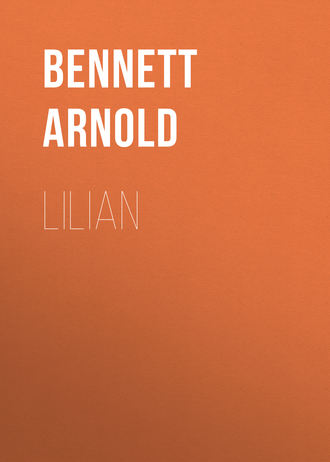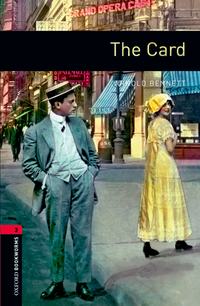 полная версия
полная версияLilian
But with Mr. Pladda at the Palais de Danse she was admirably cheerful, and Mr. Pladda was exceedingly proud of his companion, who added refined manners to startling beauty. She delicately praised his dancing, whereupon he ordered lemon squashes and tomato sandwiches. At the little table she told him calmly that she was leaving her present situation and taking another.
Back in her room she laughed with horrid derision. And as soon as she was in bed the clockwork mice started to run round and round in her head. A plot! A plot! What a burning shame! What a burning shame! … A few weeks earlier she had actually been bestowing situations on pitiful applicants. Now she herself had no situation and no prospect of any. She had never had to apply for a situation. She had not been educated to applying for situations. She could not imagine herself ever applying for a situation. She had not the least idea how to begin to try to get a situation. She passed the greater part of Sunday in bed, and in the evening went to church and felt serious and good.
On Monday morning she visited the Post Office and filled up a withdrawal form for forty pounds. She had had a notion of becoming a companion to a rich lady, or private secretary to a member of Parliament. She would advertise. Good clothes, worn as she could wear them, would help her. (She could not face another situation in an office. No, she couldn't.) The notion of a simpleton, of course! But she was still a simpleton. The notion, however, was in reality only a pretext for obtaining some good clothes. All her life she had desired more than anything a smart dress. There was never a moment in her life when she was less entitled to indulge herself; but she felt desperate. She was taking to clothes as some take to brandy. On the Wednesday she received the money: a colossal, a marvellous sum. She ran off with it and nervously entered a big shop in Wigmore Street; the shop was a wise choice on her part, for it combined smartness with a discreet and characteristic Englishness. Impossible to have the dangerous air of an adventuress in a frock bought at that shop!
The next few days were spent in exactly fitting and adapting the purchases to her body. She had expended the forty pounds and drawn out eight more. Through the medium of the slavey she borrowed a mirror, and fixed it at an angle with her own so that she could see her back. She was so interested and absorbed that she now and then neglected to feel unhappy and persecuted. She neglected also to draw up an advertisement, postponing that difficult matter until the clothes should be finished. But the house gathered that Miss Share had got her new situation. One afternoon, early, returning home after a search for white elastic in Hammersmith, she saw Mr. Grig coming away from the house. She stood still, transfixed; she flushed hotly, and descried a beneficent and just God reigning in heaven. She knew she was saved; and the revulsion in her was nearly overwhelming. A miracle! And yet-not a miracle at all; for Mr. Grig was bound by every consideration of honour and decency to get into communication with her sooner or later. Her doubts of his integrity had been inexcusable.
"I've just left a note for you," he said, affecting carelessness. "I brought it down myself because I couldn't remember whether your number was 56 or 65, and I had to inquire. Moreover, it's urgent. I want to talk to you. Will you dine with me to-night at the Devonshire Restaurant, Jermyn Street? Eight o'clock. I shan't be able to dress, so you could wear a hat. Yes or no?.." He was gone again in a moment.
Lilian literally ran upstairs to her room in order to be alone with her ecstatic happiness. She hugged it, kissed it, smothered it; then read the wonderful note three times, and reviewed all her new clothes.
VII
The Avowal
As Lilian armed herself for the field she discovered that, after all her care, she had omitted to provide several small details, the absence of each of which seemed for a few moments in turn to be a disaster. But on the whole she was well satisfied with the total effectiveness. The slattern, who had been furtively summoned, and who was made to wash her hands before touching a hook-and-eye, expressed, in whispers, an admiring amazement which enheartened Lilian in spite of its uninformed quality. The girl, as if bewitched, followed the vision down to the front door.
"If it rains you're ruined, miss," said the girl anxiously, glancing up into the heavy darkness where not a star was to be seen. "You ought for to have an umbrella."
Lilian shook her head.
"It won't rain," she answered cheerfully.
But as soon as she was fairly away from the house she felt, or thought she felt, a drop of rain, and, seeing a taxi, she impulsively hailed it, wishing to heaven the next instant that she had not been so audacious. For although twice with her father and mother she had ridden in taxis on very great occasions, she had never in her life actually taken one by herself. Her voice failed and broke as she said to the driver: "Devonshire Restaurant, Jermyn Street"; but the driver was proficient in comprehension, and the Devonshire Restaurant in Jermyn Street seemed to be as familiar to him as Charing Cross Station.
In the taxi she collected herself. She thought she was all right except for her lips. She knew that her lips ought to have been slightly coloured, but she thought she also knew what was the best lip-stick and she had not been able to get it in Hammersmith. As for her nails, she was glad that it had been impossible for her to tint them. She must remember that she was a typist, and though typists, and even discharged typists, generally help their lips to be crimson on state-nights, they do not usually tint their nails-unless they have abandoned discretion.
Lilian was glad when justifying rain began to fall. While she paid the driver at her destination, a commissionaire held a vast umbrella over her fragile splendour.
Her legs literally shook as she entered the restaurant, exactly as once they had shaken in an air-raid. Within was a rich, tiny little waiting-room with a view of the dining-room beyond. She hesitated awkwardly, for owing to the taxi she was nearly a quarter of an hour too early. A respectful attendant said:
"Are you expecting anyone, madam?"
"Yes."
"What name, madam?"
"Mr. Grig."
"Oh yes, madam. His table is booked."
She had sat down. She could now inspect herself in half a dozen large mirrors, and she almost ceased to fear for her appearance. It was her deportment and demeanour that now troubled her. In this matter she was disturbingly aware that she had both to unlearn and to learn. She looked through the glass partition into the restaurant. It was small but sumptuous; and empty of diners save for a couple of women who were smoking and eating simultaneously. People, chiefly in couples, kept arriving and passing through the antechamber. She picked up a copy of What's On, pretending to study it but studying the arrivals. Then she felt a man come in and glimpsed the attendant pointing to herself. Mr. Grig could not entirely conceal his astonishment at the smartness of her appearance. He had in fact not immediately recognized her. His surprised pleasure and appreciation gave her both pleasure and confidence.
"I'm not late," he said, resuming rapidly his rather quizzical matter-of-factness.
"No. I was too early."
The attendant took Mr. Grig's overcoat like a sacred treasure; he was shown to be in a dark blue suit; and they passed to the restaurant.
Lilian thought:
"Anyway, he can't think I've bought these clothes specially for this affair, because he only asked me this afternoon."
The table reserved was in a corner. Lilian had a full view of the whole restaurant, while Mr. Grig had a full view of nothing but Lilian. For a girl in Lilian's situation he was an ideal host, for the reason that he talked just as naturally-and in particular curtly-as if they had been at the office together. When a waiter shackled in silver approached with the wine list, he asked:
"What wine do you prefer?"
"Whatever you prefer," she replied, with a prompt and delicious smile.
"Oh, no!" he protested. "That won't do at all. If a woman's given the choice she ought to choose. She must submit ideas, at any rate. Otherwise we shall go wandering all through the wine list and finally settle on something neither of us wants."
Lilian had learnt a little about wines (she had sipped often from the paternal glass), and also about good plain cooking.
"Burgundy," she said.
Without another word Mr. Grig turned to the Burgundy page, and while he was selecting Lilian took off her gloves and gazed timidly around. It was the silver table-lamps, each glowing under a canopy of orange, that impressed her more than anything else. She saw shoulders, bosoms, pearls, white shirt-fronts, black backs-the room was still filling-all repeated in gilt mirrors. The manner of the numerous waiters corresponded to her notion of court chamberlains. This was the first high-class restaurant she had ever seen, and despite her nervousness she felt more at home in it, more exultingly happy in it, than anywhere before in all her existence. She passionately loved it, and her beauty seemed to increase in radiance. She liked to think that it was extremely costly. Compare it to the Palais de Danse, Mr. Pladda, and the tomato sandwiches! Ah! It was the genuine article at last! She took surreptitious glances also at Mr. Grig's bent face; and the face was so strange to her, though just the same as of old, that she might have been seeing it for the first time. The greatness, the enormity of the occasion, frightened her. What were they doing there together? And what in the future would they do together? Was he really and seriously attracted by her? Was she in love with him? Or was it all a curious and dangerous deception? She had always understood that when one was in love one knew definitely that one was in love. Whereas she was sure of nothing whatever. Nevertheless she was uplifted into a beatific, irrational and reckless joy. Never had she felt as she felt while Mr. Grig was selecting the Burgundy.
"Now we'd better be getting to business," said he, when the hors d'oeuvre had been removed and the soup served. "I had a letter from my sister this morning. She wrote-wait a minute!" He pulled a letter from his pocket and read out: "'I'm sorry to say I've been compelled to get rid of poor Lilian Share. She's a nice enough girl in her way, but when you're not here I'm in charge of this office, and as she couldn't treat me with the respect due to me, I had to decide at once what to do, and I did decide. I treated her generously, and I hope she'll soon get another place. She will, of course, because she can be so very attractive when she likes'-underlined-'but I fear she isn't likely to keep it unless she changes her style of behaviour.'" He smacked the letter together and returned it to his pocket. "There, you see! I'm being remarkably frank with you. I came up from Brighton on purpose to tell you, and I'm going, back by the last train to-night. My sister is quite unaware of this escapade. In fact, at the moment I'm leading a double life. Now! I've given you one version of this mighty incident. Give me your version."
Lilian, troubled, looked at her mother's engagement ring on her finger-the sole jewel she carried-and smiled with acute restraint at her plate.
"Have you got another situation? I suppose not," Mr. Grig went on.
"No-not yet."
"Have you tried for one?"
"No."
"Then what are you about?"
"Oh! My father left me a little money-very little, but I'm not starving."
"So I should judge… Well, tell me all about it."
"I didn't mean to be rude to her-really I didn't. It was about a small bill of Lord Mackworth's."
She related the episode in detail, repeating the conversation with marvellous exactitude, but with too many "she saids, she saids" and "I saids, I saids." Mr. Grig laughed when she came to the offer to pay the bill herself, and after a moment she gave a slight responsive smile. She was very careful not to make or even to imply the least charge against Miss Grig, and she accomplished the duplicity with much skill.
"I can promise you one thing," said Mr. Grig. "The moment I get back I'll see that Milly is sacked. I cannot stick that bag of bones."
"Please don't!"
"You don't want me to?"
Lilian shook her head slowly.
"All right, then. I won't. Now I'll tell you the whole business in a nutshell. My sister's a great woman. She's perfectly mad, but she's a great woman. Only where I'm concerned she's always most monstrously unscrupulous. I'm her religion-always was, but more than ever since I bought that amusing business. She was dying of boredom. It saved her. When I got myself divorced she was absolutely delighted. She had me to herself again. Her jealousy where I'm concerned is ferocious. She can't help it, but it's ferocious. Tigresses aren't in it with her. She was jealous of you, and she'd determined to clear you out. I've perceived that for a long time."
"But why should she be jealous of me? I'm sure I've never-"
"Well, she's damned clever, Isabel is, and she's seen that I'm in love with you. Gone-far gone!"
He spoke with strange detachment, as of another person.
The thud-thud of Lilian's heart appalled her. She blushed down to her neck. Her hand shook. The restaurant and all its inhabitants vanished in a cloud and then slowly reappeared. Her confusion of mind was terrible. She was shocked, outraged, by the negligently brutal candour of the avowal; and at the same time she was thinking: "I'd no idea that any man was as marvellous as this man is, and I don't think there can possibly be another man quite as marvellous anywhere. And his being in love with me is the most ravishing, lovely, tender-tender-tender thing that ever happened to any girl. And, of course, he is in love with me. He's not pretending. He would never pretend…"
She wanted to be unconscious for a little while. She did not know it, but her beautiful face was transfigured by the interplay of shyness, modesty, soft resentment, gratitude, ecstasy and determination. Her head was bowed and she could not raise it. Neither could she utter a single word. She looked divine, and thought she looked either silly or sulky. Mr. Grig glanced aside. A glimpse of paradise had dazzled the eternal youth in him. The waiter bore away the soup-plates.
"Perhaps that's enough about business for the present," said Mr. Grig at length. "Let's talk about something else. But before we start I must just tell you you're the most stylish creature in this restaurant. I was staggered when I came in and saw you. Staggered!"
She did raise her head.
"Why?" she asked with exquisite gentleness.
Mr. Grig, overwhelmed, offered no response.
As for her determination, it amounted to this: "I will be as marvellous as he is. I will be more marvellous. I will be queen, slave, everything. He doesn't guess what is in store for him." She did not think about the difference in their ages, nor about marriage; nor did she even consider whether or not she was in love with him. Chiefly, she was grateful. And what she saw in front of her was a sublime vocation. Her mood was ever so faintly tinged with regret because they were not both in evening dress.
VIII
Philosophy of the Grey-haired
The evening and all Lilian's emotions seemed to start afresh. The look of the restaurant was changed. The tables had been cleared of the grosser apparatus of eating, and showed white cloths with only white plates, fruit, small glasses, small cups, ash-trays. Most of the waiters had vanished; the remainder stood aside, moveless, inobtrusive, watchful. The diners had abandoned themselves to intimacy or the sweet coma of digestion. Some talked rather loudly, others in a murmur. Women leaned back, or put their elbows on the table, letting cigarette smoke float upwards across their eyes. A few tables were already deserted, and the purity of their emptiness seemed bafflingly to demonstrate that events may happen and leave behind absolutely no trace. Without consulting Lilian Mr. Grig gave an order and two small glasses were slowly filled to the brim with a green liquid. Lilian recognized it for the very symbol of delicate licence. She was afraid to sip, lest she might be disillusioned concerning it, and also lest the drinking of it might malignly hasten the moment of departure of the last train for Brighton.
Mr. Grig was of those who murmured. His wrists lay one over the other on the table and his face was over the table; and it seemed strange, so low and even was his speech, that Lilian could catch every word, as she did. The people at the next table could have heard nothing. All the animation and variety were in his features, none in his tone. He had been telling her about Brighton. He saw the town of Brighton as a living, developing whole, discussing it as a single organism, showing how its evolution was still in active process, and making the small group of men who were exploiting it and directing it appear like creative giants and the mass of inhabitants like midgets utterly unconscious of their own manipulation. And in his account of the vast affair there was no right and no wrong; there were merely the dark aims and the resolution of the giants determined to wax in power and to imprint themselves on the municipality. Lilian had never heard such revealing talk; she could not follow all of it, but she was fascinated, wonderstruck; profoundly impressed by the quality of the brain opposite to her and the contemptibleness of her own ignorance of life; amazed and enraptured that this brain could be interested in herself. Mr. Grig related the story of the middle-aged proprietor of one of the chief hotels who had married a young wife.
"He had broken up his family, and the family is the real unit of society-and there was no need for it! No need at all! But then, you see, he'd never had time in his existence to understand that a middle-aged man who has already had experience of marriage and marries a girl young enough to be his daughter is either a coward or a fool or without taste. He would only do it because he's mad for her, and that's the very reason for not doing it. When romance comes in that way it wants the sauce of secrecy and plotting-the double life, and so on. The feeling of naughtiness-naughtiness is simply a marvellous feeling; you must sometimes have guessed that, haven't you? – perversity, doing society in the eye. It's a continual excitement. Of course, it needs cleverness on both sides. You haven't got to be clumsy over it. The woman runs risks, but nothing to the risks she'd run in marriage. And if the thing dies out in her, and they haven't been clumsy, she's free as air to start again. She's got her experience gratis, and there's a mysterious flavour about her that's nearly the most enticing flavour on earth. Naturally people will talk. Let 'em. No harm in rumour. In fact, the more rumour the better." He went on with no pause. "You've not looked at me for about five hours. Look at me now and tell me you're disgusted. Tell me you're frightened."
She lifted her eyes and gazed at him for a few seconds, not smiling. Her skin tingled and crept. Then she sipped the crême de menthe and at first it tasted just like water.
"A woman wants making. Only a man can make a woman. She has to be formed. She can't do it herself. A young man may be able to do it, but he's like a teacher who swots up the night before what he has to teach the next day. And he's a fearful bungler, besides being cruel-unconsciously. Whereas an older man, a much older man-he knows! It's a unique chance for both of them. She has so much to give, and she has so much to learn. It's a fair bargain. Perhaps the woman has a little the best of it. Because after all she loses nothing that it isn't her business to lose-and the man may-well, he may kill himself. And the chance for a clever girl to be 'made' without any clumsiness! What a chance! … Well, I won't say which of 'em has the best of it… I'm speaking impartially. If you live to be as old as Ninon de l'Enclos you'll never meet a more honest man than I am."
Lilian felt intoxicated, but not with the Burgundy nor with the crême de menthe. Rather with sudden fresh air. She thought: "Be careful! Be careful! You aren't yourself. Something queer's come over you." She was not happy. She was alarmed. Once before she had been alarmed by herself, but this time she was really alarmed. She was glad that she had always despised boys of her own age. What did Mr. Grig mean by saying that a man might kill himself? She didn't know… Yes, she knew… She saw clearly that a woman must be formed by a man, and that until she was formed she would not be worthy of herself. She longed ardently to be formed. As she stood she was futile. She could exercise no initiative, make use of no opportunities; and her best wisdom was to remain negative-in order to avoid mistakes. Something that looked like a woman but wasn't one. She had the intelligence to realize how insipid she was. Ambition surged through her anew and with fresh power.
Mr. Grig drove her home, and the taxi was a little dark vibrating room in which they were alone together, and safe from all scrutiny. She was painfully constrained.
"Yes," said Mr. Grig, after an interminable silence. "My sister was quite right."
"What about?" Lilian asked in a child's voice.
"I'm in love. What are you going to do about it?" He turned his head impulsively towards her, gazed at her in the dim twilight of the taxi, and then kissed her. In spite of herself she yearned to give, and the yearning thrilled her.
"Please! Please!" she murmured in modest, gentle, passive protest.
Another pause.
"I shall write to you to-morrow," he said. "In the meantime, believe me, you're entirely marvellous." He was looking straight in front of him at the driver's shaggy shoulders. That was all that occurred, except the handshake.
When she let herself into the house the servant was just going upstairs to bed, after her usual sixteen-hour day.
"So you're back, miss."
"No!" thought Lilian. "It's somebody else that's come back. The girl you mean will never come back."
PART III
I
In the Hotel
Felix came quietly through the communicating door into Lilian's shuttered and close room. Between the two bedrooms was a bathroom. All the bedrooms in the hotel seemed to be designed on the same plan-too high, too long, too narrow, with the head of the bed behind the door and directly facing the window; a wardrobe, a dressing-table, a washstand, a writing-table, an easy chair (under the window), two cane chairs, a night-table, and two electric lights so devilishly arranged that they could not be persuaded to burn simultaneously; a carpet overgrown with huge, gorgeous flowers, and the walls overgrown with huge, gorgeous flowers of another but equally mirific plant. Outside the bedroom a bell rang at short intervals-all the guests in the neighbourhood performed, according to their idiosyncrasies, on the same bell-and slippered feet of servants rushing to and fro in the corridor shook the planks of Lilian's floor as they passed.
Amid the obscurity of the room Lilian's curved form, lying heaped on its side, and rather like a miniature mountain that sloped softly down towards the head and towards the feet, could be vaguely deciphered in the bed; and hillocks of attire, some pale, others coloured, some fragile and diaphanous, others resistant to the world's peering, lay dimly about on chairs and even on the writing-table. The air, exhausted by the night, had a faint and delicate odour that excited, but did not offend, Felix's nostrils.
"Is it time to get up?" Lilian murmured in the voice of a sleepy child.
"No."
Her brain slowly came to life. Flitting in and out of her happiness there were transient apprehensions-not about the morality, but about the security, of her situation. They disappeared, all except one, as soon as she looked firmly at them, because she had the most perfect confidence in Felix's good faith. The unity of the pair had begun in London, under conditions provided by Felix, who, however, did not care for them, and who had decided that he would take her away for a holiday in order that they might both reflect upon and discuss at length the best method of organizing a definite secret existence.









